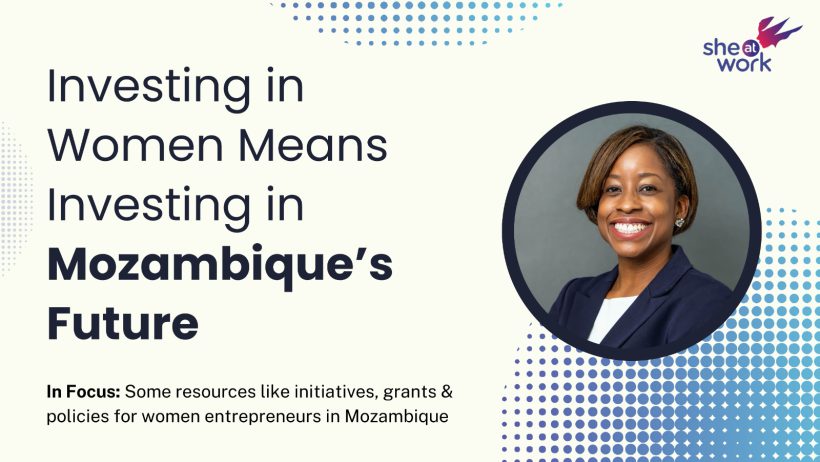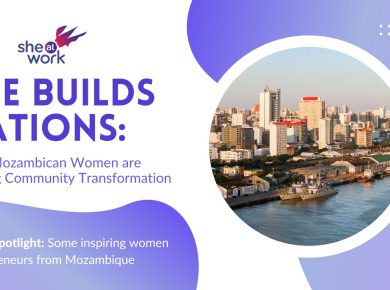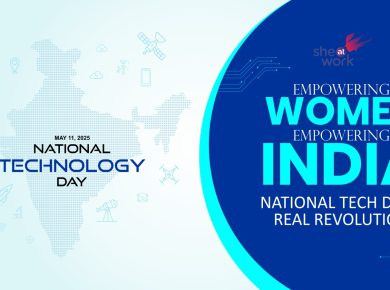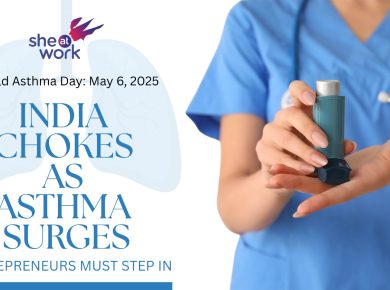In Focus: Some resources like initiatives, grants & policies for women entrepreneurs in Mozambique
#WomenInBusiness #EmpowerMozambique #AfricaLeadsWithHer #InvestInWomen
In Mozambique, popularly known as “The Mambas” – women are increasingly stepping into the entrepreneurial spotlight, becoming vital drivers of economic growth, community development, and societal transformation. As part of a broader African trend, where women own more businesses per capita than in any other region of the world – Mozambican women are defying odds to build enterprises that not only sustain their families but uplift entire communities. With nearly 26% of adult women in sub-Saharan Africa actively engaged in entrepreneurship, the potential for impact is immense -especially when we consider that women reinvest up to 90% of their income back into their families & local economies.
Subsequently, despite their proven resilience and business acumen, women entrepreneurs in Mozambique continue to face persistent challenges. Limited access to finance, lack of collateral, capacity gaps in financial literacy & restrictive legal frameworks pose significant hurdles. The estimated $42 billion funding gap for African women-owned businesses highlights the immense urgency for targeted support.
Mozambique’s Women Entrepreneurs Rise: Unlocking Growth Through Empowerment & Access
Fortunately, Mozambique is witnessing growing support for its women entrepreneurs through initiatives led by the International Labour Organization (ILO), the European Investment Bank (EIB), and the African Development Bank (AfDB). These programs aim to close the gender financing gap, build capacity, and create an enabling environment where Mozambican women can not only survive, but thrive, as entrepreneurs.
Now let us look at some resources like initiatives, grants & policies for women entrepreneurs in Mozambique.
- EIB Global and Moza Banco
The initiative by EIB Global and Moza Banco is part of the Global Gateway Strategy. What will be offered is – financing to small and medium-sized businesses in Mozambique, with a special focus on businesses owned or run by women.
The scene is that women are less likely to be able to access adequate financing for their businesses and, the EIB-Moza Banco initiative will bridge this financing gap. The project will support economic growth, prosperity & gender equality.
Access to finance for women entrepreneurs in Mozambique increased, due to a 10-million-euro loan signed by the European Investment Bank (EIB). The funding will allow Moza Banco to make available a new 20-million-euro instrument for small and medium-sized enterprises (SMEs) in the country.
This initiative also will offer loans with favourable terms – aimed at companies that are owned or led by women, that employ a significant number of women or that offer specific services for women. Funding will be available in various sectors, including manufacturing, transport, agriculture, health & services.
Broadly, the African continent has one of the highest percentages of female entrepreneurs in the world. In Mozambique, more than three-quarters of the working population derives its livelihood from a small or medium-sized business, and two-thirds of the workers in such businesses are women.
- Women in Business (WIN)
This program, in partnership with the public and private sectors, aims to facilitate market solutions for low-income women entrepreneurs.
The Women in Business (WIN) program helps women-led businesses to grow their incomes through better access to products, inputs and services, addressing gender inequality in commercial business.
The WIN program is financed by The Swedish International Development Cooperation Agency (SIDA) and implemented in partnership with TechnoServe.
It was in 2018 that this five-year program began – with a plan to grow and evolve in Mozambique with the help of experienced professionals.
WIN’s role is to identify opportunities and barriers for women and find business partners with the incentive and ability to break down those barriers. This is known as a market systems approach, or “M4P” (Making Markets work for the Poor).
https://www.technoserve.org/mozambique/women-in-business
- Gender-Centered Design Program implemented by MUVA
The World Bank launched the Gender-Centered Design Program – an acceleration program to help women entrepreneurs in Mozambique become more efficient & competitive. It is implemented locally by MUVA, a social incubator dedicated to women’s economic empowerment in the country.
This program works – to improve the economic futures of disadvantaged young women in urban Mozambique, offering various approaches to economic empowerment.
MUVA is a social incubator for female economic empowerment. They are a social incubator dedicated to empowering women and young people – to fully exercise power over their lives. Their goal is to create pathways for women and youth, particularly those from socio-economically vulnerable communities – to access meaningful opportunities for employment, self-employment & business growth.
These programs are designed – to foster confidence, resilience, and the skills needed to thrive in the labor market and beyond. By promoting mental and physical health as integral components of empowerment, they support individuals with the tools to lead sustainable, self-determined lives.
MUVA tests a range of different approaches to the economic empowerment of young women in urban areas of Mozambique. Recognizing persistent social norms and other barriers that limit their access to decent work, MUVA develops innovative projects with local partners – to build the skills they need to work, the self-confidence and vision they need to pursue economic activities, and to create new job opportunities that match their aspiration and abilities.
- Women Entrepreneurs Finance Initiative (We-Fi)
The World Bank’s Gender-Centered Design Program, implemented by MUVA, helps women entrepreneurs become more efficient and competitive. Launched in October 2017, We-Fi harnesses the public and private sectors – to open new doors for women entrepreneurs across the developing world.
The Women Entrepreneurs Finance Initiative (We-Fi) supports women entrepreneurs by scaling up access to financial products and services, building capacity, expanding networks, offering mentors, and providing opportunities to link with domestic and global markets.
Actually, they believe in women as change agents & drivers of economic growth.
The Women Entrepreneurs Finance Initiative (We-Fi) supports women entrepreneurs by scaling up access to financial products and services, building capacity, expanding networks, offering mentors, and providing opportunities to link with domestic and global markets.
- ILO’s Women’s Enterprise Development and Gender Equality project (WEDGE-Mozambique)
Focusing on promoting women’s entrepreneurship and creating decent employment, the ILO’s Women’s Enterprise Development and Gender Equality project (WEDGE-Mozambique) – aims to increase economic opportunities for women entrepreneurs in Mozambique by supporting them in starting, strengthening & expanding their businesses. It also seeks to increase knowledge about women’s entrepreneurship and amplify the voices of women entrepreneurs to influence policy-making.
The project’s objective is – to address systemic constraints faced by women entrepreneurs, promoting a more supportive environment for their businesses. It focuses on strengthening the capacity of organizations to offer gender-responsive services and advocate for women entrepreneurs. The project provides tailored training and support services to meet the specific needs of women entrepreneurs.
In 2000, the International Labour Organization (ILO) created a global initiative on Women’s Entrepreneurship Development and Gender Equality (ILO-WEDGE). For Women’s Entrepreneurship Development (WED) to be effective, it should be implemented and set in the context of Gender Equality (GE) – hence the name given to the original ILO program: WED plus GE = WEDGE. It was a means of promoting gender equality and decent work for women, who wanted to start and grow their own businesses, and for women in the informal economy who wanted to get out of poverty and move away from precarious and vulnerable work situations. At one stage in the mid-2000s, the ILO was the lead international agency promoting women’s entrepreneurship.
- African Women in Business Initiative (AWIB)
This initiative, supported by the AfDB, focuses on empowering women entrepreneurs, (particularly SMEs), through improved access to finance and a more equitable business environment.
The AfBC African Women in Business (AWIB) Global Network is a platform – created to inspire, connect, educate and support African Women across the globe to start and scale successful businesses, enhance professional career and move ahead to elevated leadership – to increase wealth and participation in the economy.
Both their vision and mission are very focused. African Women In Business (African-WIB) propels women entrepreneurs into economic, social and political spheres of power worldwide – by strengthening the wealth-creating capacity of their members and promoting economic development within the entrepreneurial community, thus creating innovative and effective change in the business culture, building strategic alliances, coalitions and affiliations & transforming public policy and influencing opinion makers.
- AFAWA (Affirmative Finance Action for Women in Africa)
This initiative, also from the AfDB, adopts a holistic approach – to empower women entrepreneurs in Africa through financing, capacity building & market access.
Affirmative Finance Action for the Women of Africa (AFAWA) is a pan-African initiative created – to bridge the $42 billion financing gap facing women in Africa.
AFAWA leverages the African Development Bank’s financial instruments to increase lending to women. It provides advisory services to ensure successful implementation of product portfolios for women, and provides technical training to women entrepreneurs to forge ahead in their businesses. AFAWA also engages with African governments to support legal, policy and regulatory reforms to reduce barriers to women in finance.
AFAWA adopts a holistic approach, driving these factors.
- AFAWA finance leverages the African Development Bank’s financial instruments and has two innovative solutions to drastically transform the banking and financial landscape in Africa and to create incentives for lending to women in business:
- A $300 million risk-sharing instrument to unlock $3 billion in credit for women businesses and enterprises in Africa. This mechanism will build upon the existing network of commercial banks and microfinance institutions to create structural change and lasting impact for women.
- A rating system to evaluate financial institutions based on the share and quality of their lending to women, and their socio-economic impact. Top institutions will be rewarded with preferential financing terms from the African Development Bank.
- AFAWA’s technical assistance provides advisory services to financial institutions to ensure successful implementation of their product portfolios for women & strengthens the capacity of women entrepreneurs through training to enhance business productivity and growth.
- AFAWA’s enabling environment engages with African governments and other key stakeholders to support legal, policy and regulatory reforms and strike down the structural barriers impeding women in business.
- The Graca Machel Trust (NFNV)
NFNV, in partnership with various organizations, has implemented innovative solutions like digital currency and financial inclusion initiatives – to support women entrepreneurs.
Without the right support, women entrepreneurs in Africa face significant limitations. It is a moment of pride to note the strides New Faces New Voices (NFNV) network is making across the continent.
From leveraging digital platforms and policy advocacy in Nigeria to promoting financial literacy and access to tailored financial products for women entrepreneurs in Zimbabwe, NFNV is driving meaningful change. Through its work, NFNV is ensuring that women across Africa have the resources and opportunities – to scale their businesses.
Since its inception over a decade ago, Graça Machel Trust (GMT) has brought together networks of African women representing a range of sectors. These networks are led by a focus to support women in their efforts to drive, influence and shape socio-economic policies in their various countries, as they work towards making a lasting impact on the continent’s developmental agenda.
GMT provides both institutional and technical support to the networks – in an effort to build a critical mass of highly qualified, active women who then become effective voices in areas where women are currently underrepresented. Their current networks include: Women in Business, Women in Agriculture, and Women in Finance and the Graça Machel Trust Scholarship Programme.
- Some Business Grants available to African women
She Leads Africa Accelerator Grant: One of the most prolific funding programs for young women in Africa, She Leads Africa is an organization committed to aiding ambitious young women to reach their goals. Founded in Nigeria SLA, it has over 700,000 women across Africa on its platform. Its Accelerator Grant is offered annually to female entrepreneurs between the ages of 18-35. It offers N2 million in investment capital to young enterprising ladies. The program lasts for 6 months and it promises to raise your profile and give you access to great business minds in Africa.
Access Bank’s Womenpreneur Pitch-a-ton Africa: This initiative is available to women entrepreneurs across the nine African countries where Access Bank operates. These include – Nigeria, Ghana, Rwanda, Zambia, Sierra Leone, Gambia, Kenya, Mozambique, South Africa, and Congo, practically every African country where Access bank can be found. They pitch a mini-MBA training program that is put together in collaboration with the International Finance Corporation. Successful applicants stand the chance of winning a grant anywhere from N5 million to N500,000.
Miss Africa Seed Grants for African Women in Tech Business: Backed by the Del York Creative Academy it promises to award $5000 to its winner, while $1000 is granted to the finalists. This grant was created to support African women in computer science or STEM fields. The NGO projects are eligible for grant funding and also include; hackathons and coding boot camps for girls, early incubation of female tech entrepreneurs, and programming and app development programs. Three winners are selected -the first prize is $5000, while the second and third prizes amount to $1000 each. The program takes place for 6 weeks.
African Women Development Fund: This funding program is a pan-African program geared toward female-led NGOs which are taking charge of social justice movements, female rights, and security. To qualify for a grant, certain criteria have to be met – including a minimum of 3 years’ experience in running the organization, must be a female-led NGO, and must have a structured organizational hierarchy. Since its inception in the year 2000, AWDF has awarded grants of US$59 million to over 1,300 women’s organizations in 47 countries in Africa and the Middle East.
US African Development Foundation (USADF) Accelerate Africa Entrepreneurship Challenge 2022: The aim of this challenge is to bolster job creation in Africa, particularly for the youth and women.
The US African Development Foundation has been set up to invest in Micro, Small, and Mid-sized enterprises (MSMEs). To be eligible to receive a grant, candidates’ businesses must procure a concise solution to a problem that is plaguing the African economy and have a sustainability metric. Successful applicants will receive anywhere from $50,000 to $250,000 from USADF Access – to support technical assistance and governance. The initiative hopes to empower youth and women – to teach them how to apply business solutions to social problems and create sustainable employment across Africa. It addresses the needs of underserved and at-risk communities and/or market demand. It defines market opportunities and supply chain linkages for youth and women-owned MSMEs.
IYBA-WE4A stands for Investing in Young Businesses in Africa – Women Entrepreneurship for Africa. The programme is aimed at empowering women entrepreneurs in selected Sub-Saharan countries through entrepreneurial skills and seed-funding.
- IYBA-WE4A programme
In 2021, the Tony Elumelu Foundation in partnership with the European Union (EU) and Deutsche Gesellschaft für Internationale Zusammenarbeit (GIZ) launched the WE4A II for sustainable & inclusive growth. This partnership is part of the overall IYBA-WE4A programme, which will work to strengthen the entrepreneurship ecosystems, access to finance and capacities of women-led MSMEs and start-ups in selected countries in Sub-Saharan Africa.
The design of the IYBA-WE4A programme seeks to address the existing capacity, business services and funding gaps for its target group – women-led MSMEs and start-ups – and strengthen relevant networks and learning on successful pathways for women entrepreneurs. Overall, the IYBA-WE4A programme in encouraging and sustaining women entrepreneurs and their businesses – contributes to the creation of employment and economic prosperity.
The initiative seeks to address economic challenges in Africa, by empowering women and youth through entrepreneurship – with a focus on financial and digital inclusion & sustainable development goals. Supporting women entrepreneurs, this programme provides training, coaching, mentoring, and funding to women-owned businesses, with a special focus on ‘green’ businesses and sectors contributing to the green transformation. It aims to increase the viability and survival rates of these enterprises.
This programme will focus on ‘green’ sectors and entrepreneurs working on greening initiatives through their businesses. Green sectors include the following and women operating in these sectors can apply:
o Sustainable agriculture and agricultural processing
o Blue economy and aquaculture
o Renewable energy
o Circular economy and waste management including biomass
o Eco-tourism
The countries where it is implemented include – Kenya, Mozambique, Tanzania, Uganda, Malawi, Senegal, Cameroon & Togo.
- Are Policies available for Women Entrepreneurs in Mozambique?
Mozambique doesn’t have a specific policy framework dedicated solely to women’s enterprise development. Instead, it relies on broader policies that support human rights, small and medium enterprise (SME) development, and economic growth. These include the Strategy for the Small and Medium Enterprise, the Gender Policy and Implementation Plan, and the National Action Plan for Women’s Advancement.
Key aspects of these policies and their impact on women entrepreneurs in Mozambique include:
Access to Financial Resources
Microfinance: Microfinance institutions play a crucial role in providing small loans with flexible repayment terms to women entrepreneurs.
Financial Literacy: Training on financial management empowers women to make informed decisions about their finances.
Support Networks: Creating platforms for women to connect, share experiences, and access mentorship opportunities fosters collaboration and support.
Education and Training
Formal Education: Initiatives focus on formal schooling and vocational training programs.
Vocational Training: Training programs should align with local market demands and offer skills in areas like agriculture, textiles, and technology.
Mentorship: Connecting women with successful female role models provides guidance and support.
Legal Framework
Equal Rights: The Constitution of Mozambique enshrines equal rights between men and women in all areas of life.
Entrepreneurial Activity: Women can undertake entrepreneurial activities without legal restrictions.
Discrimination: The law prohibits discrimination in access to credit based on gender.
Property Rights: Men and women have equal rights to property and inheritance.
Challenges
Limited Access to Resources: Women entrepreneurs often face challenges related to access to financial resources, markets, and networks.
Social Norms: Social norms that discourage women from pursuing economic opportunities can hinder their entrepreneurial efforts.
- Policies Affecting Gender Equality & Women Empowerment
Mozambique has made progress in advancing gender equality and improving the lives of women and girls, but challenges still remain in several areas – from health to early marriages. The scale of these challenges calls for concerted actions from the Mozambican government, communities and international partners – to sustain progress on the gender equality and women’s empowerment (GEWE) agenda.
Mozambique is advancing gender equality and women empowerment (GEWE) based on its commitment at international and regional levels, domesticated through national laws and policies and materialized by national plans and programmes. In 2007, the country developed a gender policy and an accompanying implementation strategy (República de Moçambique 2018a). Updated in 2018, it provides guiding principles with the view to enable decision-making and the identification of actions – to elevate the status of women and improve gender equality. Several ministries also developed their own gender strategies – that sought to incorporate the gender dimension in their programmes and structures.
The Government’s Five-Year Programme (PQG) for 2020-2024 guides policies in all areas of the national public administration and includes a gender dimension under the Human Development and Social Justice Strategic objectives, although not in other policy domains (República de Moçambique 2020).
As an external plan to promote GEWE worldwide, the EU’s Gender Action Plan III – An Ambition Agenda for Gender Equality and Women’s Empowerment in EU External Action (GAP III), released in December 2020, opened up an opportunity for enhanced collaboration between the EU, the Mozambican state and its civil society (EC 2020). The parallel programming of EU external action, a complex exercise that defines the EU priorities and financial allocations in different contexts, offers the chance – to better integrate gender objectives into the EU action for the period 2021- 2027 (Di Ciommo 2021).
Quite prominently, Mozambique has made progress in improving the lives of women and girls in the last few years and, it has a set of policy and legislation in place that can enable progress in the coming years.
Still, many blockages exist that hinder full realization of gender equality and women empowerment in the country. Overcoming these challenges will ultimately depend on the local circumstances and the efforts of national stakeholders. But, it is significant that international partners like the EU can play an important role in supporting change. The EU is a recognized international partner in the realization of the GEWE agenda in Mozambique and its agenda overlaps in many ways with that of Mozambique. The EU is also taking some positive steps to put gender higher up in the cooperation arrangements for the 2021-2027 period, under the new financial instrument the NDICI and through the implementation of the GAP III.










